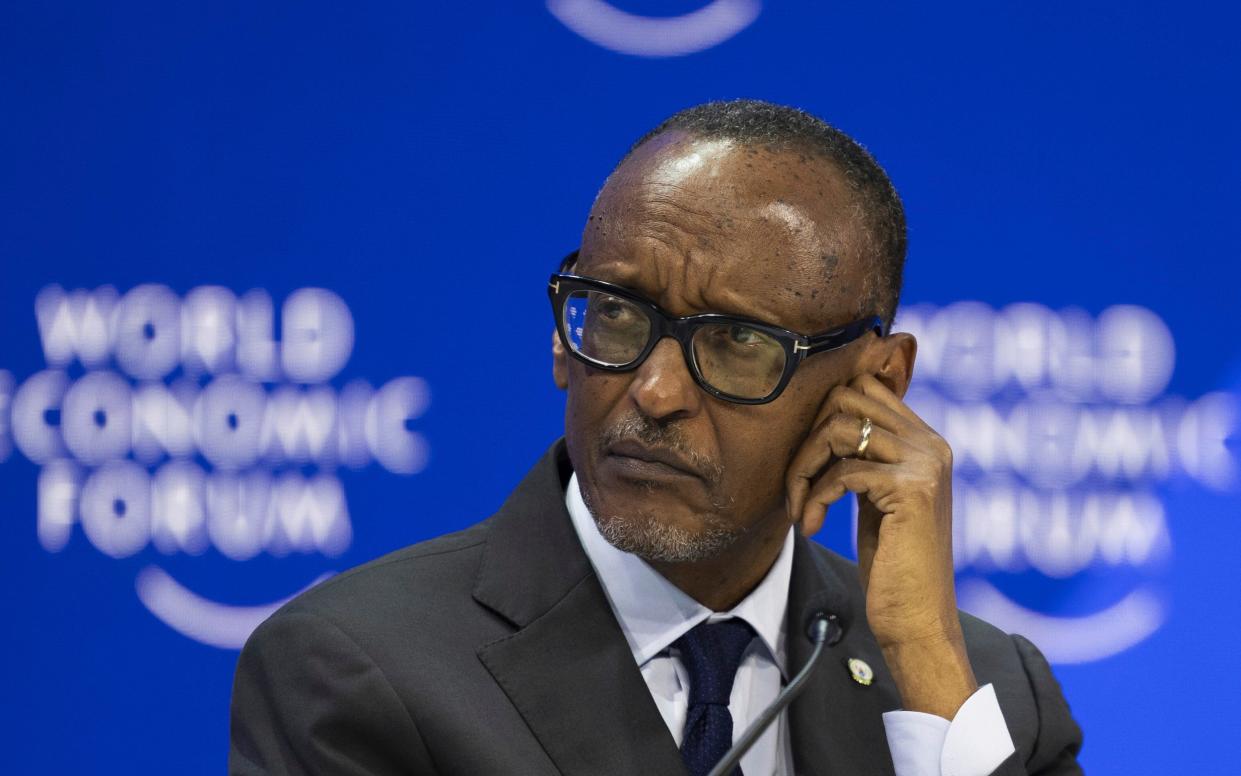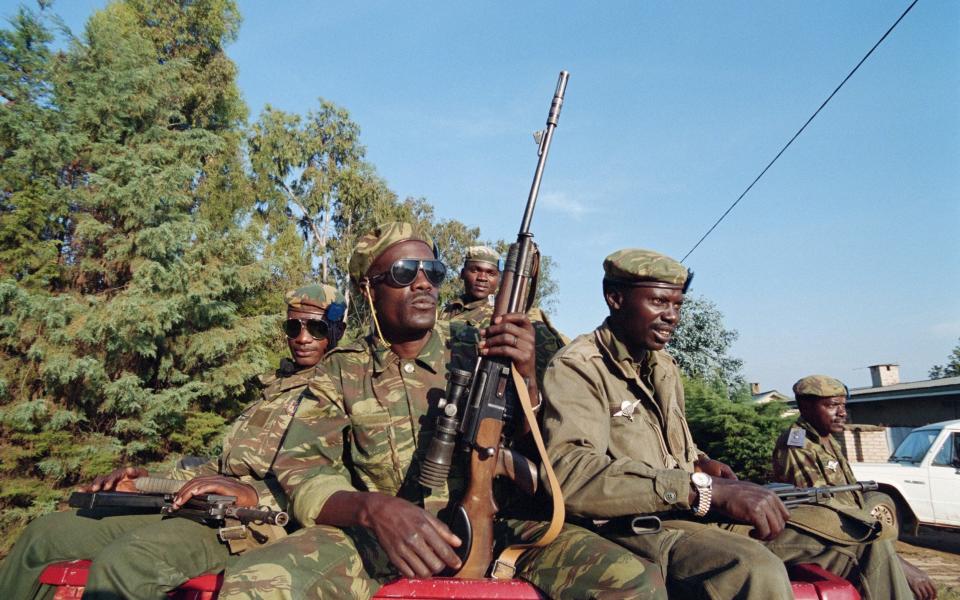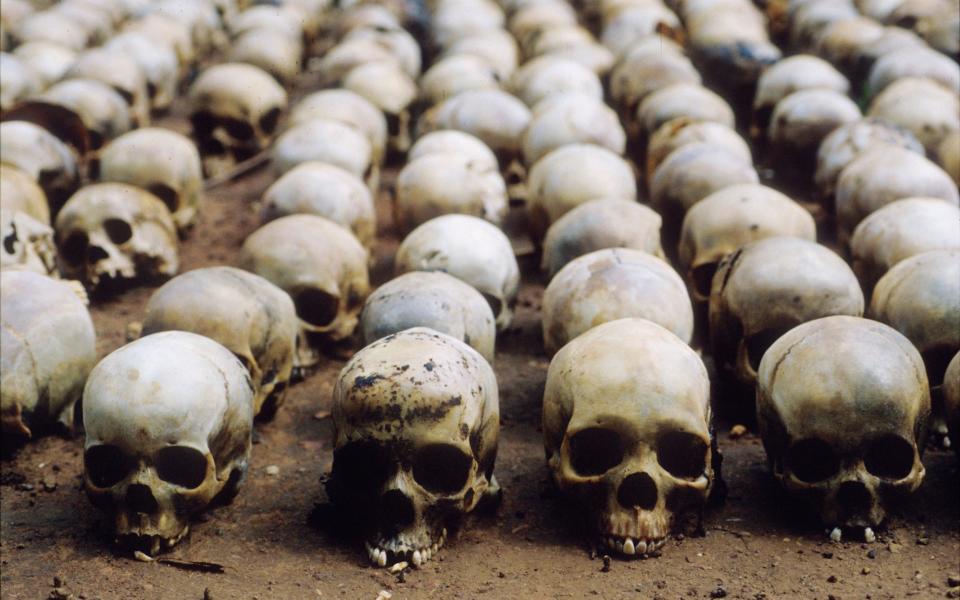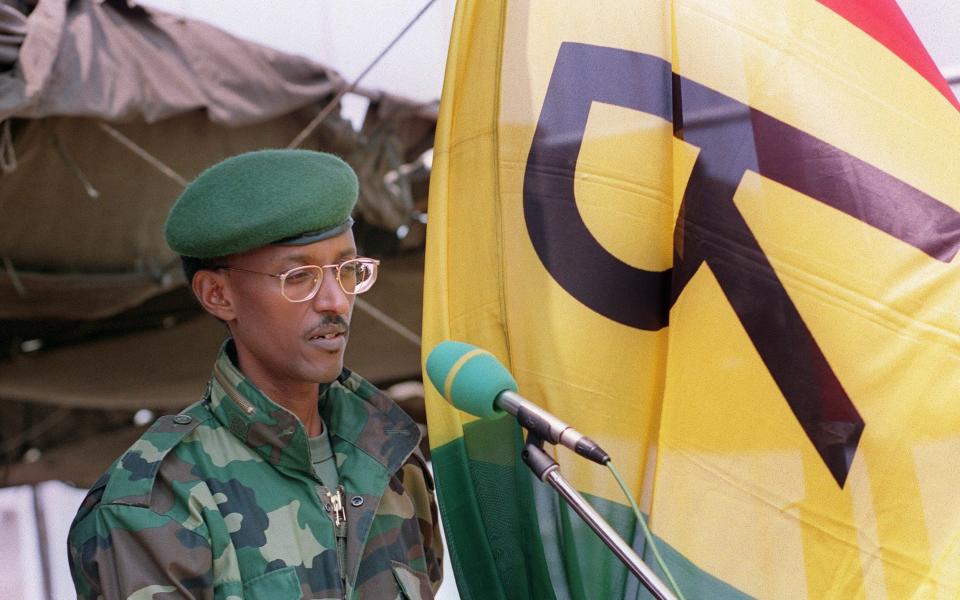Critics of Rwanda policy ‘align themselves with genocide deniers’

- Oops!Something went wrong.Please try again later.
Progressives who oppose the Rwanda deportation policy are aligning themselves with genocide deniers, Rwanda’s government has claimed.
In an article for The Telegraph, Alain Mukuralinda, a government spokesman, said extremists intent on denying the 1994 genocide and undermining the stability of Rwanda were “piggy-backing” on the criticisms by “progressive” critics and politicians in the UK.
He also accused “progressives” of using the Rwanda policy as a “proxy” for attacks on the UK Government as he insisted that his country was safe for asylum seekers, citing how it was supporting more than 130,000 refugees including those sent by the United Nations High Commissioner For Refugees.
Rwanda has been ruled by Rwanda Patriotic Front (RPF) since the genocide in 1994 in which between 500,000 and 800,000 ethnic minority Tutsis were killed by the Hutus. Paul Kagame, the de facto leader of the RPF, served as vice-president from 1994 and has been president since 2000.

The RPF began a programme of rebuilding the infrastructure and economy of the country, bringing genocide perpetrators to trial and promoting reconciliation between Hutu and Tutsi.
But those perpetrators, and their supporters who deny the genocide, are understood to be trying to exploit criticisms of the Rwanda scheme in the UK to weaken the government.
The RPF-led Rwandan government has launched an offensive against refugee camps in Zaire, home to exiled leaders of the former regime and millions of Hutu refugees. This action started the First Congo War in 1996, which removed Mobutu Sese Seko, the long-time dictator and president, from power. As of 2023, Mr Kagame and the RPF remain the dominant political force in Rwanda.
It is the first detailed statement of the Rwandan’s position since the Supreme Court verdict last November, which found the country “unsafe” for asylum seekers.
The Government has since signed a new legally binding treaty and introduced the Rwanda Bill to correct the concerns of the Supreme Court and limit the scope for legal challenges to block the deportation of illegal migrants to the central African state to claim asylum there.
The article reflects the frustration within the Rwandan government at the criticism by opponents of the scheme, understood to include the opposition parties, church leaders, charities and some elements of the media.
It comes ahead of Monday’s second reading debate of the Rwanda Bill in the House of Lords when the legislation is expected to be savaged by peers who believe it breaches international law and rides roughshod over migrants’ human rights.

The scale and brutality of the Rwandan genocide caused shock worldwide, but no country intervened to forcefully stop the killings.
Mr Mukuralinda said: “For the progressives, we have become a proxy for attacks on the UK Government, and for the extremists, it’s a hook to undermine the stability and unity of our country by piggy-backing on the unjustified criticisms levelled against Rwanda by UK politicians.
“Even though information is at everyone’s fingertips these days, we don’t blame progressives for not understanding who they are aligning themselves to. They simply do not know our history, or are rightly preoccupied by their own agendas.
“But if they paused to look into it, I’m sure they wouldn’t elevate the profile and status of individuals who are at best genocide deniers or dangerous ethnic ideologues by parroting their talking points.”
He cited one recent article by an alleged holocaust denier which interwove the concerns expressed by MPs and Lords with “outlandish” claims about genocide denial. He claimed it amounted to “pure gaslighting” of the country.
“When progressive politicians next want to take aim at the migration and economic partnership, I urge them to look into the people they’re joining forces with, genocide deniers and people who want to use violence and hate to take our country back to the days of chaos and conflict,” said Mr Murkuralinda.
“I also hope that they take a minute to consider whether it’s appropriate to take shots at a country – that is succeeding in transforming our economy and our society – simply because they disagree with the UK Government’s migration policy.
“Surely progressives shouldn’t be attacking a country for putting into practice successful, forward-looking values – simply to advance their own agenda?”
More than 70 peers are due to speak in the second reading on Monday including the Bishop of Durham who said the Church of England would support attempts to water down the Bill.

“I remain deeply concerned at all the implications of the Rwanda Bill,” he said. “It raises significant constitutional questions regarding the role of the executive and the judiciary, and there are significant concerns around our commitments to international treaties and agreements if the UK is to continue to play a key role in the international scene.
“Fundamentally I remain convinced that this is a poor policy. We should not be handing over our responsibilities for asylum seekers to anyone else. I remain unconvinced that it will achieve the stated intention of deterring those seeking to reach the UK, and so will not stop the boats.
“Bishops in the House of Lords will approach this Bill in the same way as the last – guided by our Christian teaching and values and informed by the experience of many in the Church of being alongside asylum seekers and refugees.
“It is the role of the Lords to improve legislation and we take that responsibility seriously. Party politics doesn’t come into it.”
An aide to James Cleverly, the Home Secretary, said: “It’s regrettable that our partners in Rwanda have to spell some of this out at all.
“However in the face of some very ill-informed and out-dated descriptions of their country they have to state things we already know to be true.
“Rwanda is genuinely offering to be part of a responsible solution to a global problem and some of the criticism they currently face is at best unfair, at worst distasteful.”
‘Bill is being used cover for attacks on the UK Government’
By Alain Mukuralinda
Ever since the announcement of the UK-Rwanda migration and economic development partnership, an unsettling alliance has been formed. Self-proclaimed progressives have, perhaps unwittingly, joined with advocates of the extremist Hutu Power movement, the very same people who perpetrated the Genocide Against the Tutsi, to launch attack after attack on Rwanda.
Critics of the partnership have questioned our motives; expressing doubts over our ability to care for those who would come here under the partnership; seemingly ignoring the truth that we currently support over 130,000 refugees in Rwanda with more arriving every day. And they’ve used the partnership as a cover. For the progressives, we have become a proxy for attacks on the UK Government, and for the extremists, it’s a hook to undermine the stability and unity of our country by piggy-backing on the unjustified criticisms levelled against Rwanda by UK politicians.
Even though information is at everyone’s fingertips these days, we don’t blame progressives for not understanding who they are aligning themselves to. They simply do not know our history, or are rightly preoccupied by their own agendas. But if they paused to look into it, I’m sure they wouldn’t elevate the profile and status of individuals who are at best genocide deniers or dangerous ethnic ideologues by parroting their talking points.
In one recent article, the case was made for why, to the author’s mind, Rwanda wasn’t safe for migrants and asylum seekers. Written by someone who consistently promotes genocide denialism, the piece raised some of the concerns expressed by some MPs and Lords, but these were interwoven with outlandish claims about Rwanda’s history and our efforts at reconciliation. They claim Rwanda’s economic development isn’t real. But worse, they cast doubt on the true history of our country.
The NGO that the author represents, pushes a double genocide theory – a false equivalence tactic to obscure the responsibility of those who planned and perpetrated the massacre of at least a million Tutsi children, women and men, as well as those who stood in the way of a meticulously planned genocide.
This NGO has given political cover and platforms to the leaders of the Democratic Forces for the Liberation of Rwanda (FDLR) genocidal militia, made up of the remnants of the killers who fled Rwanda in 1994. These genocidaires regrouped and have launched deadly attacks on Rwanda ever since, in a bid to bring down a government that has turned Rwanda around and is delivering transformational change.
‘This is pure gaslighting’
Imagine this in another context. A genocide is carried out in Europe. Many of the perpetrators flee to neighbouring countries. Some form armed groups and threaten the reconciliation and security of the citizens in the rebuilt country, including genocide survivors. While others claim political asylum then build media profiles for themselves and their families and run innocuous-seeming campaigns to cast doubt on the true history of what took place. This would not be tolerated. But for Rwandans, we’re not only supposed to accept this, but to also accept politicians and media outlets giving these people a voice and credibility. This is pure gaslighting.
No country is perfect but Rwanda is putting into practice values and choices that fit our context and that are delivering results for all Rwandans.
Our economy is growing consistently and sustainably, improving the living standards of millions of Rwandans. Life expectancy has almost doubled – with Rwandans now living on average until they’re 70. We have made huge strides in gender equality; women make up 65 per cent of our parliament, female CEOs lead some of our most successful companies, and women are in decision-making positions at all levels of society.
In fact, gender empowerment has been a major factor in our country’s renewal and development.
Rwanda will remain open to the world, seeking to work with like-minded partners to solve global challenges, such as future pandemics: Africa’s first vaccine manufacturing facility, a project delivered in partnership with BioNTech, was recently opened in Rwanda.
We are also welcoming to anyone who comes to our country – be they economic migrants, refugees, students, tourists or the hundreds of journalists who have found a new interest in our country. We welcome people because many Rwandans know what it was like to seek safety abroad. But we have since worked together to build a country we’re proud of.
When progressive politicians next want to take aim at the migration and economic partnership, I urge them to look into the people they’re joining forces with – genocide deniers and people who want to use violence and hate to take our country back to the days of chaos and conflict.
I also hope that they take a minute to consider whether it’s appropriate to take shots at a country, which is succeeding in transforming our economy and our society, simply because they disagree with the UK Government’s migration policy.
Surely progressives shouldn’t be attacking a country for putting into practice successful, forward-looking values, simply to advance their own agenda?
Alain Mukuralinda is an official spokesman for the government of Rwanda

